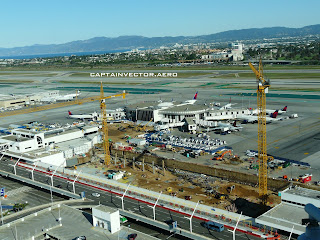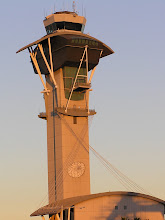Today was supposed to be my final day as an air traffic controller. After twenty-eight years of entertaining the pilots, the six-day weeks and rotating shifts had gotten old. While I hadn't planned on leaving early, my enthusiasm for the job had morphed into exhaustion. At the last minute, an unexpected shift swap arrangement gave me hope that I could make it through the end of the year.
Then the COVID-19 virus situation got serious. New York and California both put out "Stay at home" orders. Several air traffic facilities had to curtail services when personnel were diagnosed with the coronavirus. Last time I mentioned some of the accommodations that the FAA was using to handle the developing situation. Since then, things have changed almost daily. As I write this, the US now leads the world in coronavirus cases. Traffic at LAX has plummeted; yesterday we barely broke a thousand operations for the entire day. If not today, then tomorrow we'll see our first three-digit day.
The staffing at most FAA air traffic facilities has been trimmed to minimum numbers so that we are able to allow more space between controllers as they work. We're also going to alternating schedules so that we won't lose the entire workforce in a facility if one controller comes down with COVID-19. In order to minimize the opportunities for cross-contamination, controllers are being scheduled in groups that are consistently together, while other groups are being held on a sort of ready reserve. Thus, while we may still have to sanitize the facility, there will be another group of controllers available to keep things running while the first group goes into isolation/recovery. There's even another group on reserve in case that group gets sick. I don't know how long we'll have to work under these conditions, but we'll be here for the airplanes that are still moving.
And there are still airplanes moving. Passengers are few and far between, but while the seats may be empty the cargo holds are not. Airlines often have to work the balance of passengers versus cargo. That's probably not a problem right now. Passengers are higher profile, but often the cargo pays better. Freight is definitely still moving. All those N-95 masks and ventilators have to get delivered. Oh, and the toilet paper too.
The airport is trying to take advantage of the traffic slow-down to get more airfield construction projects done. We've had various runway and taxiway closures and there are going to be more. Work on the MSC continues apace, and we're expecting the north end to open later this year. Most of the glass is in at Terminal 1.5. Concrete is being poured at Gate 131. More cranes are working on the people mover in front of the TBIT. Another crane is about to appear between Terminals 4 & 5. Here's the latest photos:
A couple of other shots:
 |
| Ladies and gentleman, this was supposed to be a non-smoking flight |










The husband was doing some safes for TBIT, T6 and T7 for customs this week and said he has never seen the airport so empty. The next day he was down at SNA and said it was like a ghost town as well.My daughter has a round trip ORD-LAX=ORD in July, 140$.
ReplyDeleteStay well. Love the photos.
I will miss seeing all the great pics you have shared with us on this blog. Whenever I have watched youtube videos of a GA aircraft doing a transition through the Bravo airspace or a flight incident at LAX in the news, I always wonder if you were the controller handling the aircraft.
ReplyDeleteI watch a couple of vloggers on youtube: a pilot who is still very busy with cargo flights, and a flight attendant who is working only a few trips with near empty planes, empty terminals, and very few food options at layover hotels. I suppose that mechanics are being kept busy maintaining the grounded fleets so they are ready to go when traffic picks up again, but terminal, ramp, and ground transportation workers are probably not getting many hours these days. Interesting how this is affecting the different segments of aviation.
I guess it is better in your situation where you suddenly have a vastly lowered workload, but still have some flights to work. Would controllers at low-traffic controlled GA airports still be working, or would those fields now be considered "non-essential" and the minimal traffic now being managed as an uncontrolled field?
I haven't commented much, but I have read most of your blogs on this site. If you are going to be posting more blogs in the future, I look forward to reading them.
If this was the end however, then THANK YOU for all the great information and pictures you have shared. Best wishes for your health (in these times) and also for your future endeavors.
Joel in Oregon
Captain Vector,
ReplyDeleteGlad you're able to stay around for awhile. Hopefully all of you guys (ATCers) are getting a well deserved respite. Maybe even (oh my lord!)....a five day work week!
I was at LAX the morning of 9/11. While the brief cessation of flights was surreal, the impact of this situation will be far longer in duration, and far greater in scope.
Best regards to you.